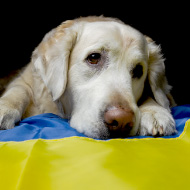
What support is available for Ukrainian refugees coming to the UK with pets?
Fleeing a war is an incredibly traumatic experience, and fleeing with pets can provide an additional source of stress, along with many logistical difficulties. The UK Government has created emergency support protocols so that Ukrainian refugees do not have to leave their pets behind when entering the UK.
Whether you are supporting a refugee, or are a Ukrainian looking to enter the UK with a pet, staying up-to-date on the latest information will help with the process.
Emergency Government support
In light of the situation in Ukraine, the Government has put emergency protocols in place for Ukrainian refugees travelling with pets. Any Ukrainian refugee wishing to enter the UK with pets can use an emergency licence to bring their pets into the country with any quarantine, vaccination and microchipping costs covered by the Government.
The Animal and Plant Health Agency is providing quick license approvals and quarantine arrangements including travel, so that owners will not need to worry about this.
To ensure that the Government can put these measures into place when a refugee arrives, they will need to contact the Animal and Plant Health Agency at pettravel@apha.gov.uk, or call +44 3000 200 301 and select option 2. If possible, this should be done as soon as is able, preferably before the refugee travels, or upon arrival at the UK border.
When a pet arrives into the UK, it will need to be quarantined for up to four months, although this is the maximum quarantine period, and many pets will have a significantly shorter quarantine, depending on a number of circumstances, including vaccination status. During this time the pet will be assessed by a veterinary surgeon, and given vaccinations and a microchip if necessary.
New blood test to detect rabies
Alongside covering the cost of quarantine, vaccination and microchipping, the UK Government is offering a new rabies blood test to reduce the time that the pets of Ukrainian refugees will have to stay in quarantine.
This new test will be able to detect existing rabies vaccinations, which will help to release pets from quarantine faster and maintain the UK's strict biosecurity measures.
Vets for Ukrainian Pets scheme
A new scheme has been set up across Europe to help Ukrainian refugees with the cost of veterinary care, and the UK is a part of this. Named 'Vets for Ukrainian Pets', the scheme will provide free-of-cost veterinary care to the pets of Ukrainian refugees.
Launched by Humane Society International (HSI), Vets for Ukrainian Pets will cover the treatment costs of up to five dogs, cats, horses or other pets, up to €250 per animal.
The scheme will help with acute care and medication, vaccinations, and medical examination.
Get in touch
We’re looking to hear from anyone who has applied to the Homes For Ukraine scheme for a series on MRCVSOnline and VNOnline. What has been your experience of the process so far, and what advice would you give to anybody looking to host refugees in the UK? Please email editor@mrcvs.co.uk
Find out more:
Support for Ukraine: Helping veterinary colleagues - What support is available for vets seeking refuge in the UK?
Support for Ukraine: Taking action - How to help when you don't have a spare room.
Support for Ukraine: Making Connections - How to find a Ukrainian individual or family to sponsor.



 The Veterinary Medicines Directorate (VMD) is inviting applications from veterinary students to attend a one-week extramural studies (EMS) placement in July 2026.
The Veterinary Medicines Directorate (VMD) is inviting applications from veterinary students to attend a one-week extramural studies (EMS) placement in July 2026.